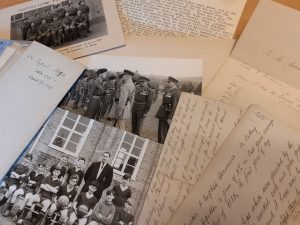Sherborne Museum in Dorset has a very small volunteer team who are working to get their archive collections catalogued and published online using Manage Your Collections.
Brief introduction to your archive and collections
Sherborne Museum was founded in 1966 by members of the Sherborne Historical Society and, as a community museum, our archive collections largely reflect the town and neighbouring villages that fall within our catchment area. The holdings include ‘true’ archive collections (e.g. records from local grammar schools, businesses and organisations), as well as some ‘artificial’ collections (e.g. material brought together by local antiquarians) and several boxes of reference material and ephemera (e.g. programmes, newspaper cuttings) collected by museum staff over the last 50 years. The collections are held in a workroom on the top floor of the museum and are overseen by a small volunteer team.

Items from the Foster’s Grammar School collection held in the archive at Sherborne Museum
Deciding to use Manage Your Collections
We had no way of publishing collections information online prior to using Manage Your Collections (MYC). As a small, independent museum, run entirely by volunteers, we don’t have the facilities to initiate a comparable search facility on our own website. Although it is intended to supplement our uploads to Discovery with downloadable PDF catalogues on our website, the search facility that Discovery offers will allow much wider access to our collections information. We chose MYC for our archive because, after investigating our options, it seemed most user-friendly. Since our volunteers are not trained archivists and have had to learn as much as possible on the job, we needed something that was easy to use. The technical support received from The National Archives has also been a great help to us. Secondly, it made sense to us to use a platform initiated by the archive sector leader.
Your approach to cataloguing collections for publication online
The cataloguing process and our use of MYC is part of a wider, ongoing audit of our archive collections. Until relatively recently, our holdings had not been treated much like archive collections but more as reference library material, with some collections having been split up and categorised by subject or theme (industry, churches, schools, etc), presumably for ease of retrieval due to the lack of robust cataloguing. Sadly, this means the original order and provenance had been lost in many cases. Quite a strenuous effort is now being made to re-establish the collections and their provenance by referring back to office paperwork (accessions registers, entry forms, correspondence, etc) and physically bringing items back together again, with the aim of cataloguing them properly. Two volunteers have been supporting me in this work, helping to re-box collections in acid-free materials and undertaking basic preventive conservation, such as dusting volumes, and carrying out conditions checks. Our priority for cataloguing will be larger collections of ‘true’ archives, many of which have higher research value.
What value do you see in getting your collections information published via an online platform?
The ultimate goal of our audit has always been to make our collections more accessible to researchers, so the prospect of being able to publish this information online (and for free) is an exciting one for our volunteer team. Accessibility isn’t just a watchword for us – we see it as a fundamental step in moving our organisation forward. Publishing collections information online will enable us to better connect with our audiences (both users and non-users) and ensures that the material has a real value, in that it can be used. To an extent, it also improves transparency; as the museum acts as a guardian of the town’s heritage, it’s important that the public can see what we hold and can access it if required.
Contact the archive
Luke Mouland, Volunteer Archivist, archives@sherbornemuseum.co.uk